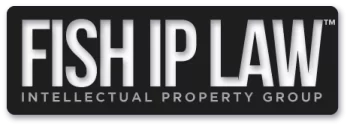NEWS
Who Gets Credit When AI Invents? A Look at the History—and Future—of Inventorship
For centuries, governments have tried to encourage innovation by offering inventors something valuable in return: ownership. The earliest forms of state-recognized intellectual property—like patents—were meant to reward people for coming up with new solutions to problems. But it hasn’t always worked the way we’d like to imagine.
From Royal Favors to Inventor Rights
Between the 14th and 17th centuries, the English crown handed out patents. But these weren’t always about protecting brilliant ideas—sometimes they were just political favors, granting monopoly rights to the well-connected.
Things began to shift in the 18th century. Under Queen Anne, inventors had to submit detailed specifications explaining how their inventions worked. This marked a move toward recognizing patents not as tools of privilege, but as protections for genuine intellectual contributions.
In the U.S., this principle was written into the Constitution.

Queen Anne
The Patent and Copyright Clause gave Congress the power to protect inventors’ rights “to promote the progress of science and the useful arts.” James Madison himself argued that useful inventions belonged to those who created them. By the late 1800s, several countries—including England, France, and Germany—had formal patent laws recognizing inventors’ intellectual ownership.
The Core of Modern Inventorship: Conception
Today, especially in U.S. patent law, inventorship hinges on a key concept: conception. The inventor isn’t necessarily the person who builds the invention, but the one who conceives it—the one who had the original idea.
Some ground rules:
- Only someone who contributes to the mental formulation of the invention can be an inventor.
- There can be multiple inventors, but each must contribute to at least one claim in the patent.
- Simply carrying out instructions or building a prototype? That’s not inventorship.
Over time, the legal system evolved from handing out monopolies to truly honoring the individuals behind technological progress—those whose ideas shaped the future.
Then Came Generative AI
In recent years, AI has complicated things.
Autonomous AI systems can now generate ideas, designs, and even prototypes. But who’s the inventor when a machine contributes core ideas? Most global patent offices, including the U.S. Patent and Trademark Office (USPTO), say only a natural person—a human—can be listed as an inventor.
The courts have backed this up. In Thaler v. Vidal, the Federal Circuit ruled that AI can’t be an inventor under current U.S. law. However, that ruling left a critical question open: What about inventions developed by humans working with AI?
The USPTO's 2024 AI Guidance
In early 2024, the USPTO released new guidance aimed at clarifying this gray area. The agency said that a human can be listed as an inventor of an AI-assisted invention if they make a “significant contribution” to the final invention—even if they didn’t fully conceive it.
This marks a shift. Under this standard, a person could take AI-generated output, shape it meaningfully, and claim inventorship—even if their input alone wouldn’t qualify as an invention.
Legal Risks on the Horizon
This softer standard raises eyebrows in the legal community. Critics argue it contradicts patent law’s long-standing requirement of full human conception. And because USPTO guidance doesn’t carry the force of law, patents issued under this standard might not hold up in court.
There’s also risk for patent attorneys. Filing patents based on this weakened inventorship standard could raise ethical issues under the duty of disclosure rules, especially if the AI did most of the heavy lifting.
And here’s a surprising twist: the USPTO’s standard for inventorship may now be lower than the standard for patentability itself.
Looking Ahead
We’re at a crossroads. On one hand, AI is a powerful tool for accelerating innovation. On the other, our current legal framework still centers on human inventorship.
Without new legislation or clearer judicial rulings, this tension will likely grow. For now, inventors, companies, and patent attorneys should tread carefully. The future of inventorship in the AI era is still being written—and it’s far from settled.
Check out our FishFAQ video: The History of Patents
For other articles related to AI and Inventorship: Federal Circuit to AI Innovators: Generic Machine Learning Isn’t Enough for a Patent
The Impact of Third-Party Litigation Funding on Patent Disputes
A Patent’s Value Means Little Without the Means to Defend It
Valuing a patent isn’t simple. Methods like the cost, market, and income approaches are commonly used. But even a high-value patent may be worthless if its owner can’t afford to enforce it in court. Legal battles over patent rights are notoriously expensive, with median costs surpassing $3 million in some cases. For small patent holders, this financial barrier can put them at a major disadvantage. Especially when facing infringement by larger, better-resourced companies.
What Is Third-Party Litigation Funding (TPLF)?
Third-party litigation funding offers a potential solution. These firms provide financial support to litigants in exchange for a portion of any settlement or award. Importantly, TPLF is usually non-recourse—if the case is lost, the litigant owes nothing. Returns for funders can be significant, ranging from 200% to 400% or more. The growing number of TPLF firms in the U.S. since 2013 reflects the profitability of this model. For under-resourced patent owners, TPLF can level the playing field. It enables them to pursue cases they would otherwise have to abandon.
The Rise of Patent Trolls
However, TPLF has also fueled concerns about abuse. Non-practicing entities (NPEs), often called “patent trolls,” acquire patents solely to generate income through licensing or litigation. These entities exploit the system. When backed by TPLF, they gain the resources to aggressively pursue lawsuits, raising ethical and legal questions.
TPLF: Leveler or Enabler?
TPLF firms aren’t altruists; their funding decisions are driven by expected returns, not justice.
As a result, they’re more likely to fund cases with a high likelihood of success. Whether the claims serve a broader social good or not. When TPLF and NPEs align, the result may be more predatory litigation and fewer cases that actually promote innovation or fairness. Most courts don’t require disclosure of funding arrangements. This makes it even harder to determine whether TPLF is helping or harming the system.
The Debate Over Disclosure
A December 2024 Government Accountability Office (GAO) report examined TPLF’s role in patent litigation. It found that requiring disclosure of litigation funding could uncover conflicts of interest, reveal foreign involvement, and encourage settlements. If defendants realize their opponents are well-funded, they are incentivized to settle. On the other hand, funders argue that disclosure has no bearing on a case’s legal merits and could unfairly tip the scales in favor of defendants while adding administrative burdens to the courts.
The GAO report also noted a rise in TPLF-backed patent cases over the past five years. However, precise data is elusive due to the lack of disclosure requirements. One estimate suggests that over 60% of patent infringement lawsuits filed since 2020 have received third-party funding.
A Tool for Smaller Players—With Caveats
For small patent holders facing possible infringement, TPLF can provide a much-needed lifeline to defend their rights. Still, the system’s increasing complexity and potential for misuse raise valid concerns about transparency and fairness. As the debate over regulation continues, both benefits and drawbacks of TPLF remain under scrutiny.
For more information on valuing patents, try this section of our Patent FAQs: Valuing Patents
Generic Drug Label Doesn’t Induce Patent Infringement Just by Listing Optional Refrigeration
Generic Drug Labels and Inducement to Patent Infringement
In the ever-evolving world of pharmaceutical patent law, a recent Federal Circuit decision offers guidance on when a generic drug label may induce patent infringement. The case, Metacel Pharmaceuticals LLC v. Rubicon Research Private Ltd., focused on storage instructions for Rubicon’s generic version of Metacel’s Ozobax® oral baclofen solution.
Metacel held U.S. Patent No. 10,610,502, which included a method claim requiring storage of the baclofen solution at refrigerated temperatures between 2°C and 8°C. When Rubicon sought FDA approval through an ANDA, its proposed label instructed storage at room temperature but also stated that the product “can also be stored at 2°C to 8°C.”
Metacel argued that this optional refrigeration language would lead physicians and other healthcare providers to infringe the patented method. Both the District Court and the Federal Circuit disagreed, holding that Rubicon’s label did not induce infringement.
Federal Circuit Rejects Inducement Based on Optional Storage Instructions
The Federal Circuit’s analysis centered on whether Rubicon’s label encouraged or recommended infringement, as opposed to merely permitting it. The court emphasized that inducement requires affirmative encouragement of infringing conduct.
Here, the label’s primary instruction was to store the product at room temperature, which was non-infringing. The refrigeration language was framed as optional rather than mandatory.
Judge Lourie, writing for the panel, explained that the label conveyed that “if a downstream user decides to refrigerate the product, despite instructions to store the product at room temperature (which is noninfringing), then it should store the product at temperatures from 2°C to 8°C.” That permissive statement, the court held, did not amount to inducement.
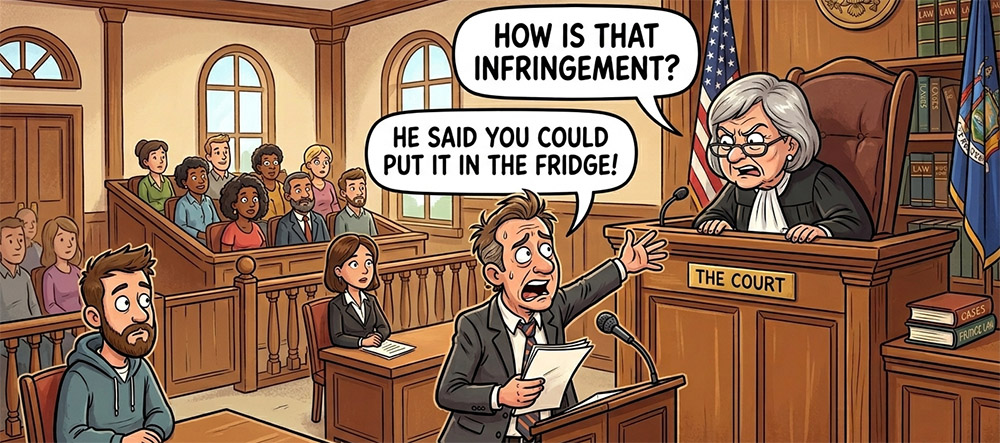
Permissive Label Language Does Not Induce Patent Infringement
The decision aligns with prior Federal Circuit precedent, including HZNP Meds. LLC v. Actavis Labs. UT, Inc. In that case, the court similarly held that permissive label language does not necessarily encourage infringement, particularly where the label does not require performance of the patented method.
The key distinction is between language that merely allows a potentially infringing use and language that directs or recommends it. Where a label primarily instructs users toward a non-infringing use, optional references to infringing conditions are generally insufficient to establish inducement.
ANDA Statements Cannot Override the Drug Label’s Instructions
Metacel also relied on statements Rubicon made in its ANDA regarding refrigeration. However, both courts rejected that argument.
The Federal Circuit reiterated that inducement analysis focuses on what healthcare providers actually see and follow. That means the operative document is the drug label, not internal regulatory filings. Statements made during the ANDA process cannot transform otherwise permissive label language into inducement.
The relevant question remains whether the label itself instructs users to perform the patented method.
ANDA Statements Cannot Override the Drug Label’s Instructions
The court further emphasized that when label language is clear and unambiguous, extrinsic evidence cannot override its plain meaning. Even circumstantial evidence suggesting potential infringing use is insufficient where the label does not affirmatively encourage that use.
This reinforces the importance of careful label drafting. Courts will rely on the actual words presented to end users, rather than speculative interpretations or regulatory background materials.
Implications for Generic Drug Labels and Patent Inducement Claims
This decision confirms that generic drug manufacturers retain some flexibility when drafting labels. Including optional information does not automatically create inducement liability, provided the label’s primary instructions direct users toward non-infringing conduct.
For patentees, the case highlights the difficulty of establishing inducement based solely on permissive label language. For generic manufacturers, it underscores the value of precise wording that distinguishes between required instructions and optional conditions.
Ultimately, Metacel v. Rubicon serves as a reminder that in patent inducement cases, label language matters—and clarity can be decisive.
Related articles on patent law infringement cases: Divided Infringement
Federal Circuit to AI Innovators: Generic Machine Learning Isn’t Enough for a Patent
In a closely watched decision, the Federal Circuit delivered a clear message. Simply applying machine learning to a new domain is not enough. Unless the ML itself improves, the invention will not qualify for a patent.
In Recentive Analytics, Inc. v. Fox Corp. (No. 2023-2437, Apr. 18, 2025), the court affirmed dismissal of four patents. Those patents were held by Recentive Analytics. Each focused on using machine learning for TV broadcast scheduling and event planning.
Although the court acknowledged AI’s growing importance, it drew a firm boundary. Patent eligibility under 35 U.S.C. § 101 still requires more.
Federal Circuit Decision on AI Patent Eligibility
At its core, the case addresses a pressing question. When does applying artificial intelligence make an invention patent-eligible?
According to the Federal Circuit, Section 101 applies fully to AI-related inventions. Merely invoking machine learning will not suffice. Instead, the patent must claim a concrete technological improvement.
In other words, automation alone is not innovation.
The Patents at Issue in Recentive Analytics v. Fox
Recentive’s patents fell into two categories.
Machine Learning Training Patents
First, the training patents claimed systems for generating optimized live event schedules. These schedules relied on historical data. The goal was dynamic, real-time optimization.
Network Map Patents
Second, the network map patents addressed channel assignments. They focused on how television programs were distributed across regions and times.
Overall, the inventions aimed to replace manual scheduling. In its place, they proposed automated optimization using machine learning.
Why the Federal Circuit Found the AI Patents Ineligible
The court emphasized a central principle. Generic machine learning methods are abstract ideas. Without a specific technological improvement, they remain ineligible. Applying ML to a manual task, such as TV scheduling, did not change the outcome. Section 101 requires more than digitizing an existing process. As the court explained:
“Patents that do no more than claim the application of generic machine learning to new data environments… are patent ineligible under § 101.”
That language leaves little room for doubt.
Why the Machine Learning Patents Failed Under Section 101
Several deficiencies proved fatal to the claims.
No New Machine Learning Technology
Importantly, Recentive admitted it did not invent a new ML algorithm. Rather, it used existing techniques. The court viewed this as little more than saying “do it with AI.” A new application alone was not enough.
No Specific Implementation Details
Equally problematic, the patents lacked technical detail. They did not explain how the ML models operated.
Nor did they describe any improvement to computer functionality. Without that specificity, the claims remained abstract.
Limiting AI to a Field of Use Is Not Enough
Recentive argued that applying ML to broadcasting made the invention patentable. However, the court disagreed. Limiting an abstract idea to one industry does not make it less abstract. This principle has appeared repeatedly in Section 101 cases.
Increased Speed Does Not Equal Patent Eligibility
The patents also emphasized efficiency and automation. Yet faster processing does not automatically create eligibility. Courts have long rejected speed alone as an inventive concept. That reasoning applied here as well.
No Inventive Concept Under the Alice Framework
Finally, the court considered step two of the Alice framework. Even there, it found nothing “significantly more” than the abstract idea itself. As a result, the claims failed both steps of the analysis.
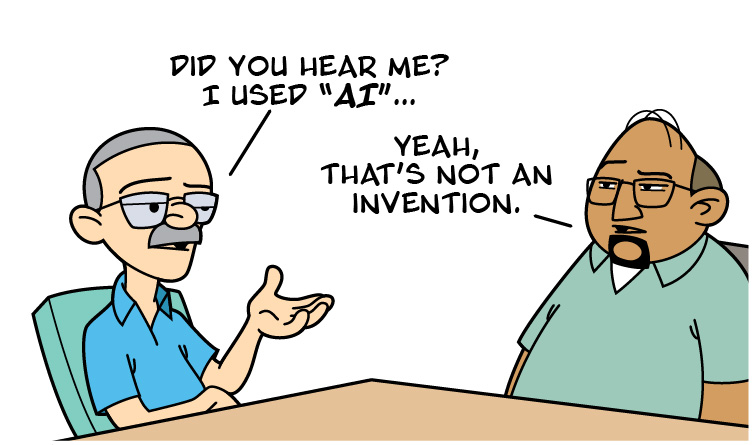
What This Decision Means for AI and Machine Learning Patents
Taken together, the ruling draws a bright line. Using AI is not the same as improving AI.
For patent eligibility, applicants must identify a specific technological advance. Simply automating a manual workflow will not suffice. Likewise, applying known techniques to new data will not qualify.
Importantly, the decision does not eliminate AI patents altogether. Innovations that enhance machine learning technology may still succeed. However, the claims must show real technical progress.
Key Takeaways for AI Patent Applicants
As AI becomes embedded in more industries, scrutiny will increase. Section 101 remains a powerful filter.
Therefore, patent applicants should focus on technical improvements. Detailed implementation matters. Concrete advances in machine learning matter even more.
Without those elements, AI-based claims may struggle to survive.
Related AI articles: USPTO AI subject matter eligibility guidance
The Fintiv Pendulum Swings Back — What Patent Litigators Need to Know
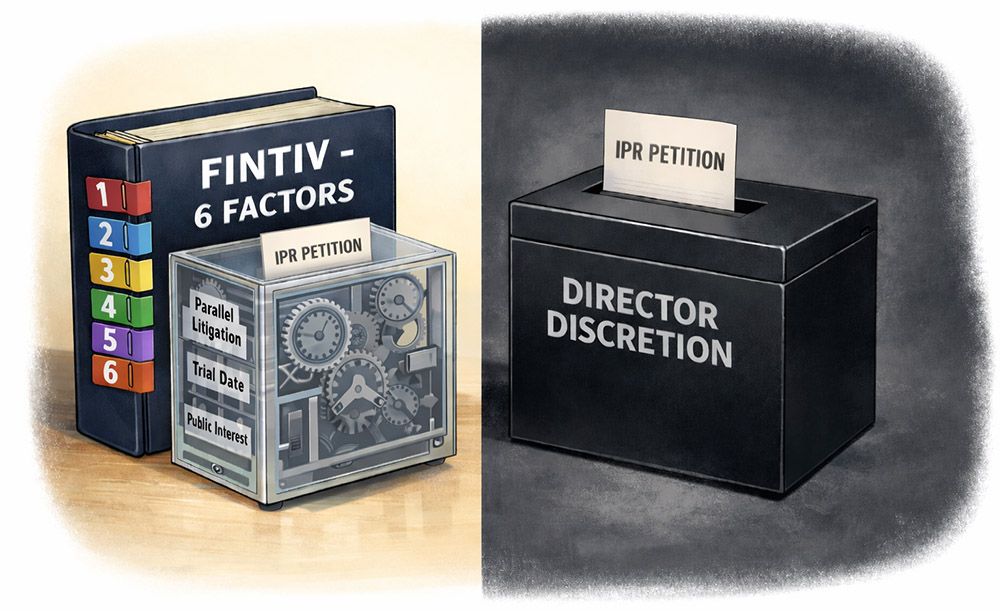
The rule book and the black box
USPTO Rescinds the Vidal Memorandum
Acting USPTO Director Coke Stewart has rescinded the June 2022 Vidal Memorandum. The move is sending ripples through the patent world.
That memo limited the PTAB’s ability to issue discretionary denials of inter partes review (IPR) petitions. The limits applied mainly when parallel district court litigation was pending.
Now, with the memo withdrawn, the PTAB regains broader discretion. As a result, many expect an uptick in discretionary denials.
The Return of the Fintiv Framework
So, what does this shift mean for patent stakeholders?
In short, the PTAB can again rely heavily on the Fintiv framework. This framework includes six factors. These factors guide whether to deny an IPR petition when district court litigation overlaps.
For example, the PTAB considers how soon trial is scheduled. It also evaluates how much investment the court has made. In addition, it looks at whether the same issues appear in both forums.
Put simply, if a case is already advancing in court, the PTAB may decline review.
A Policy Pendulum in Motion
Importantly, this is not the first policy shift. Under former Director Kathi Vidal, the USPTO added guardrails. Those changes made discretionary denials less likely. Petitioners could submit a Sotera stipulation to limit district court defenses. They also could show “compelling evidence” of unpatentability. Together, those options made the IPR process more predictable. They also made it more accessible.
Strategic Implications for Patent Owners and Petitioners
Now, however, those protections are gone. Consequently, both patent owners and petitioners must adjust strategy. Patent owners will likely push district court cases forward more aggressively. Faster trial dates can support arguments against IPR institution. Meanwhile, petitioners may need to file IPRs earlier. They also should consider requesting early stays in district court. These steps may reduce Fintiv-related risk.
The Bottom Line
Ultimately, PTAB policy is once again in flux. Therefore, practitioners must stay agile.
Although discretionary denial standards may shift, core principles remain. Timing matters. Coordination matters. Strategy matters more than ever.
For more updates on IPR discretion: Protecting the Little Guy… or Bad Patents?
Federal Circuit Clarifies Limits on Prosecution Disclaimer Across Patent Families
Federal Circuit Limits Cross-Family Prosecution Disclaimer
In Maquet Cardiovascular LLC v. Abiomed Inc., the Federal Circuit clarified prosecution history disclaimer across related patents. The court vacated a district court judgment of non-infringement. It also provided guidance for patent prosecutors and litigators.
Case Background and District Court Ruling
Maquet sued Abiomed for infringing U.S. Patent No. 10,238,783 and its parent, U.S. Patent No. 9,789,238.
The district court relied on prosecution history from related patents. It applied two negative limitations to the asserted claims. Those added limitations narrowed claim scope. As a result, the court found non-infringement in favor of Abiomed.
Federal Circuit Reverses the Claim Construction
On appeal, the Federal Circuit rejected that approach. The court emphasized that prosecution disclaimer does not automatically extend across related patents.

Instead, disclaimer applies only when claim language is substantially similar.
Key Takeaways on Prosecution History Disclaimer
This decision reinforces several important principles.
Substantial Similarity Between Claims Is Required
First, parity between claims matters. Prosecution disclaimer carries over only when claim language is substantially similar. Without that similarity, importing limitations from an earlier patent is improper.
Disclaimer Requires Clear and Unmistakable Statements
Second, disclaimer must be clear and unmistakable. Mere silence does not create disclaimer.
Failure to dispute an examiner’s statement is not enough. Therefore, applicants do not need to respond to every reason for allowance.
IPR Statements Must Meet the Same High Standard
Third, the court addressed disclaimer during inter partes review. Statements made during IPR can support disclaimer. However, they must meet the same clear and unmistakable standard. Vague or broad statements generally will not limit claim scope.
Practical Guidance for Patent Prosecutors
This case offers practical guidance for patent professionals. First, differentiate claim language across related patents when appropriate. Doing so may reduce the risk of unintended limitations. Second, draft prosecution and IPR statements carefully. Avoid broad or ambiguous language that could narrow claim scope.
Finally, remember that silence is not automatic acquiescence. In many cases, there may be no need to contest every examiner comment.
Why the Maquet Decision Matters
Ultimately, Maquet helps preserve control over claim scope. It also limits the automatic spread of disclaimer across patent families.
As a result, patent owners have clearer boundaries when litigating related patents.
The Harsh Reality of § 101 Appeals: Why Fighting a Rejection at the PTAB Is an Uphill Battle
PTAB § 101 Affirmance Rates Continue to Climb
For inventors and patent practitioners, securing a patent has always been challenging. Overcoming a § 101 rejection is even harder. The latest 2023 data confirms a troubling trend. The Patent Trial and Appeal Board upheld examiner § 101 rejections 91% of the time. That number rose from 87.1% in 2021 and 88.4% in 2022. The trend makes one thing clear. Appealing a § 101 rejection usually ends in disappointment.
Why the PTAB Is So Tough on § 101 Appeals
The high affirmance rate is not just about weak applications. It reflects deeper structural problems.
Since the Supreme Court’s Alice Corp. v. CLS Bank decision, patent eligibility law has been unstable. The framework remains confusing and inconsistent.
The Federal Circuit has issued conflicting rulings. Meanwhile, the PTAB often disregards the USPTO’s own eligibility guidance. This inconsistency has produced strange outcomes. In some cases, a diamond-encrusted drill bit and a camera phone were labeled “abstract ideas.” As a result, applicants face unpredictable decisions. Outcomes often feel arbitrary rather than grounded in clear legal standards.
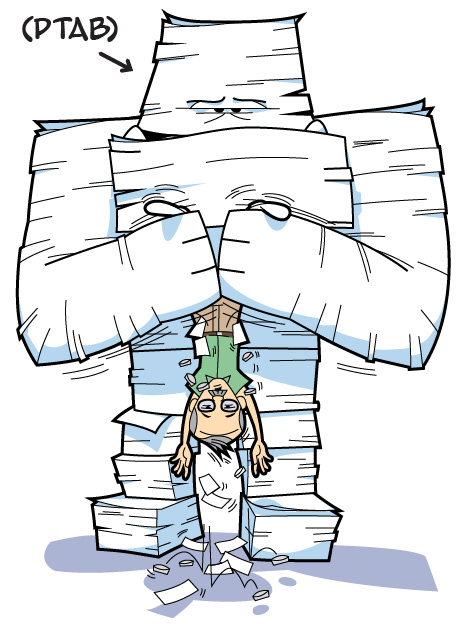
The Patent Beast as the PTAB
Which USPTO Technical Centers Are the Harshest?
Not all USPTO Technical Centers treat § 101 appeals equally. Some are significantly tougher than others.
TC3600 and TC3700: Business Methods and Financial Technology
These centers have the worst outcomes. Affirmance rates exceed 95%. Business method patents frequently land in these centers. Inventors in these fields face especially steep odds.
TC2100: Computing and Software Technologies
TC2100’s affirmance rate climbed to 85% in 2023. It stood at 80% in 2022. This increase suggests broader trouble for software patents. The impact extends beyond business methods.
Other Technical Centers
Some technical centers show lower affirmance rates. However, the data is limited. TC2400 and TC2600 may offer slightly better outcomes for software-related applications. Still, results vary.
The Most Common “Abstract Idea” Categories
The PTAB typically relies on three main categories when affirming § 101 rejections.
- Mathematics (17% of affirmances)
- Mental processes (48%)
- Methods of organizing human activity (68%)
These categories often overlap. Some applications are rejected under multiple rationales.
Mental process rejections are common in TC2100. Organizing human activity dominates TC3600 decisions.
The Hidden Risk: New § 101 Rejections on Appeal
Even if an examiner does not issue a § 101 rejection, risk remains. The PTAB can introduce one. In 10% of cases, the PTAB issued a new § 101 rejection. These applicants were caught off guard. This risk is especially high in TC2100. Examiners there may be more lenient during prosecution. The PTAB often is not.
Strategic Options for Responding to a § 101 Rejection
Given these statistics, appealing is rarely the best first move. Strategic prosecution decisions matter more than ever.
Applicants should consider several approaches.
- Work with the examiner to amend claims and pursue allowance before appealing.
- Use TC steering tools to anticipate assignment outcomes.
- Avoid TC3600 and TC3700 when possible.
- Carefully evaluate claim amendments before filing any appeal.
When an appeal is unavoidable, preparation is critical. Expect a difficult path.
Final Thoughts on § 101 Appeals at the PTAB
The PTAB’s 91% affirmance rate in 2023 is a serious warning. The system remains inconsistent and difficult to navigate.
Legislative or judicial reform may eventually bring clarity. Until then, early prosecution strategy is essential.
Once an application reaches the PTAB, the odds of reversal are slim.
Check out our FishFAQ video: Rejections
